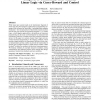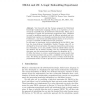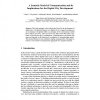28 search results - page 3 / 6 » Combining Classical and Intuitionistic Implications |
ICFP
2010
ACM
13 years 5 months ago
2010
ACM
While many type systems based on the intuitionistic fragment of linear logic have been proposed, applications in programming languages of the full power of linear logic--including...
CLIMA
2010
13 years 6 months ago
2010
Simple type theory is suited as framework for combining classical and non-classical logics. This claim is based on the observation that various prominent logics, including (quantif...
BIRTHDAY
2010
Springer
13 years 5 months ago
2010
Springer
Yuri Gurevich and Itay Neeman proposed the Distributed Knowledge Authorization Language, DKAL, as an expressive, yet very succinctly expressible logic for distributed authorization...
AIML
2004
13 years 6 months ago
2004
abstract. The aim of the present paper is to analyze the complexity of strict implication (together with falsum, conjunction and disjunction). We prove that Ladner's Theorem r...
AUSAI
2001
Springer
13 years 9 months ago
2001
Springer
This study attempts to find a theoretical basis for the development of digital cities. The ultimate function of a digital city is to support navigation in an environment. Navigatio...



